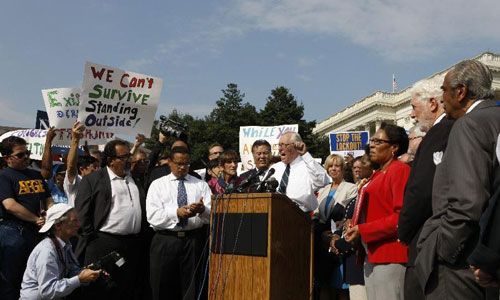HOME >> WORLD
Deadline looms as US Congress split on default
By Reuters – Xinhua Source:Reuters – Xinhua Published: 2013-10-8 0:53:01

Furloughed federal employees hold placards during a protest event outside the US Capitol to demand an end of federal workers' lockout after the government shutdown in Washington DC on October 4, 2013. Photo: Xinhua
As the US government moved into the second week of a shutdown on Monday with no end in sight, a deadlocked US Congress also confronted an October 17 deadline to increase the nation's borrowing power or risk default.
Republican House of Representatives Speaker John Boehner vowed not to raise the US debt ceiling without a "serious conversation" about what is driving the debt, while Democrats said it was irresponsible and reckless to raise the possibility of a US default.
The last big confrontation over the debt ceiling, in August 2011, ended with an 11th-hour agreement under pressure from shaken markets and warnings of an economic catastrophe if a default were allowed to occur.
In comments on Sunday political talk shows, neither Republicans nor Democrats offered any sign of impending agreement on either the shutdown or the debt ceiling, and both blamed the other side for the impasse.
"I'm willing to sit down and have a conversation with the president," said Boehner, speaking on ABC's This Week. But, he added, President Barack Obama's "refusal to negotiate is putting our country at risk."
On CNN's State of the Union, Treasury Secretary Jack Lew said: "Congress is playing with fire," adding that Obama would not negotiate until "Congress does its job" by reopening the government and raising the debt ceiling.
Meanwhile, China - the biggest holder of US Treasuries - urged Washington to take decisive steps to avoid a crisis and ensure the safety of Chinese investments.
"The US is totally clear about China's concerns about the fiscal cliff," vice finance minister Zhu Guangyao said, in the Chinese government's first public comment on the October 17 deadline.
"We hope the US fully understands the lessons of history," Zhu told reporters in Beijing, referring to the downgrade of the US credit rating by Standard & Poors in 2011.
Under the current situation, Zhu advised the US Treasury Department to take the first step to ensure the interest payments of government bonds and then pay the principles through the replacement of old debt by new.
The two issues of the federal government shutdown and the debt ceiling started out separately in the House but have been merged by the pressure of time.
Conservative Republicans in the House have resisted funding the government for the current fiscal year until they extract some concession from Obama that would delay or defund his signature healthcare law, which launched October 1.
Many of those conservatives want a similar condition placed on raising the debt ceiling.
Harry Reid, leader of the Democratic-led Senate, is expected to decide soon on whether to try to open formal debate on a "clean" bill - without extraneous issues attached - to raise the US Treasury's borrowing authority.
Republican lawmakers have floated other ideas, such as a very short debt limit increase, which would create time for more negotiation at the expense of further market uncertainty, and repeal of a medical device tax.
Agreement in the Senate would send the snarl of issues back into the House, whose Republican caucus has adopted a hard line on both Obamacare and the debt ceiling.
Posted in: Americas